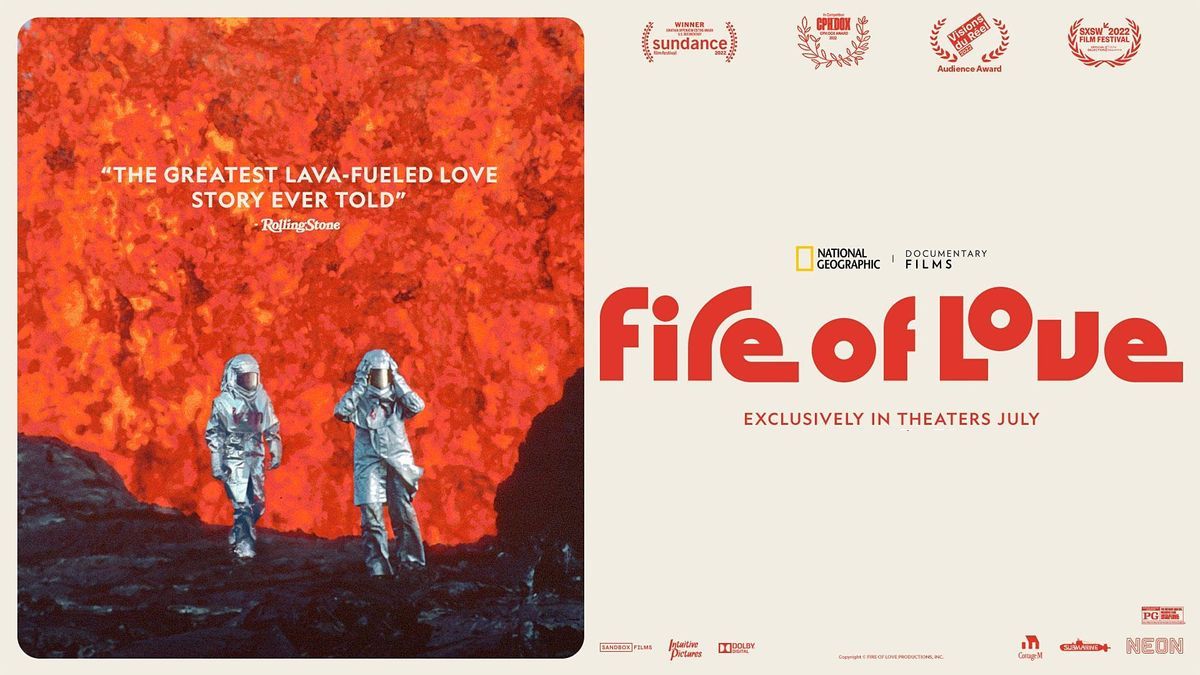By Glenn Dunks

There are three big reasons to see Fire of Love, preferably on the big screen if possible. The third I will get to later, but the first is the story. That of a couple who found themselves through the admittedly rather niche field of volcanology. There’s is one of mutual respect and adoration that I admired also for how much faith they granted the public to understand their world. You certainly don’t see that every day.
The second is the archive footage that makes up the entirety of its runtime. It’s a beauty and a truly wonderous, jaw-dropping visual spectacle.
There are no interviews or talking heads here, only (annoyingly persistent, I’ll admit) narration by Miranda July to go along with the decades of video that charts Katia and Maurice Krafft’s earliest days as a couple through to their death on the slopes of Mount Unzen, Japan, in 1991. Incredibly vivid footage that pulsates with molten oranges, ashy blacks and charcoal greys with that classic warmth not found in contemporary digital photography. I’m not sure if this is (or will) get an IMAX release, but what an experience that would be! You can truly appreciate the effort that went into capturing these stunning images, knowing what it took and how it was accomplished.

Katia and Maurice were from France, pioneers in the study of volcanoes. Their often death-defying stunts would usually take them right up to the edge or on top of the flowing lava that built much of this planet we inhabit. Their innate understanding of volcanoes and how they work meant they would be able to sit atop or even inside active volcanoes so as to best capture on film their raging, natural beauty. They realised that in order for humanity to truly understand the power of a volcano, people had to see it. And for 21 years of marriage that is exactly what they did. They forgo children to better understand the world we all live in and to educate its people about something that is a natural part of this planet’s existence yet is perceived with fear and danger (for obvious reasons, but still—the planet is just doing what the planet does). He would often attend television talk shows while she wrote, edited and collated their books. All to finance their lives as the most envied and respected volcanologists in the industry.
The couple’s story has already featured in one recent documentary. Werner Herzog’s rather excellent Into the Inferno (that movie’s co-director Clive Oppenheimer appears in the credits here as, I think, a consultant). Here, however, they are the story. Director Sara Bosa has predominantly worked as a producer, but I heard good things about her 2019 Icelandic folk-doc, The Seer and the Unseen. Beyond the Kraffts, though, it is editors Erin Casper and Jocelyne Chaput who are the stars here. While they work the scientists’ story down a linear path, they do so by cutting up the Kraffts’ films, home movies and media appearances into an entertaining and thrilling rhythm. While the outcome of their story is well known and documented, the diversions and the detours it takes to get there are nicely detailed. It’s not surprising they won the editing prize for documentary at this year’s Sundance Film Festival.

Ultimately, I think Fire of Love works most of all for the third reason that I said I’d get to in due course. I think Bosa’s movie would impress the Kraffts not just because of how the story is lovingly, affectionately told, or because it has so glorious preserved their life’s work in pristine, big-screen quality. Rather it is because Fire of Love works as an educational resource, too. Their partnership is the core, but the Kraffts were always about taking viewers into the earth and explaining how life springs forth from it. You can’t have a romance or the movies without it and by making her film equally about the mechanics of how this planet functions alongside that of the human heart, Bosa has made something that carries their legacy with it. And that is something I didn’t quite expect, but which makes for a movie that is just that bit extra special.
Release: Opens today in limited release through NEON and National Geographic. I hope more places get the opportunity to see it on a big screen. It will eventually end up on Disney+.
Awards chances: Seems like a prime contender for the seemingly annual shock ‘snub’ ala other all-archival docs like Apollo 11 and Jane. I suspect it will do very well for itself during awards season and if I were National Geographic, I would be trying to get voters to see this on the big screen as much as humanly possible. Just like their winner Free Solo, it will really benefit from not just being seen on a TV with a watermark blazed across it.